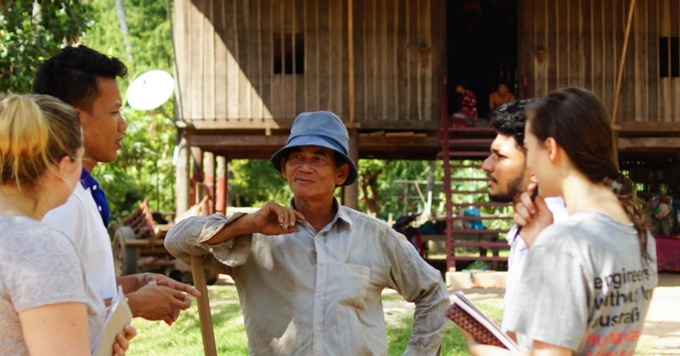This year, the College of Engineering and Computer Sciences will award the Humanitarian Engineering minor to its first recipients. Three distinguished members of that cohort are Benjamin Hoffman, Adele van der Winden and Charlotte Fell.
Hoffman and van der Winden will both be graduating at the end of 2021, with Fell set to graduate in 2022.
Fell was enrolled in an Arts Law Degree when she left for a gap year in Cambodia, volunteering as an English and Maths teacher at the Cambodian Children’s fund. She first learnt about Humanitarian Engineering after meeting a colleague’s partner that was on placement with Engineers Without Borders. Fell then made her first inquiries about the Humanitarian Engineering minor at ANU and decided to make the change to a Bachelor of Engineering and Asian Studies degree. It was apparent to Fell how humanitarian engineering could effectively bring together technical, social and cultural aspects of a project. Something she considered critical when designing technologies in developing communities.
“I am passionate about further developing renewable technologies to make sustainable energies more accessible to communities both within Australia and the broader Indo-Pacific region,” Fell said. “In particular, I aim to research how these technologies can be utilised in developing regions, inspired by the humanitarian engineering ethos of organisations such as Engineers Without Borders Australia.”
Convenor Dr Jeremy Smith has served as a bridge between EWB and ANU, having devoted his career to an approach to engineering that involves local communities in co-designing solutions to local problems. In 2015, Smith and ANU colleagues collaborated with EWB to offer ENGN3013, which was the first dedicated later-year humanitarian engineering elective in Australia.
Ben Hoffman said he was excited to be one of the first ones to try the course out. “My favourite area of focus is definitely human-centered design. It has made me better appreciate what good design is and the responsibilities engineers have in day-to-day life.”
Hoffman has already found the course to be applicable to his work experience outside of the university.
Hoffman was working in the Australian Public Service within data management, where he saw an opportunity to apply the “human centered design principles” he learnt in the Humanitarian Engineering course. “I created a series of tools for the team to use,” he said. “I designed the interface first and designed the tool requiring minimum interaction and being intuitive to use.”

Van der Winden is currently completing her undergraduate degree at Queensland University of Technology (QUT), but travelled to Canberra to complete the HumEng course through a cross-institutional study program between ANU and QUT. Like her ANU classmates Hayley Yates and Jack Hill, van der Winden said her experiences at the Engineers without borders Humanitarian Design Summit inspired her to enrol in the Humanitarian Engineering minor at the ANU College of Engineering and Computer Sciences (CECS).
ANU partners with Engineers without Borders on the Design Summit, which has sent 1200 students to six countries for two-week programs based in local communities to “gain insights into best-practice community development, and appreciate the role engineering plays in creating positive change”.
Both Hoffman and van der Winden were fortunate to attend Summits overseas before COVID impacted travel.
Hoffman attended a Design Summit in Nepal in 2018. “I think the highlight from a learning perspective was talking to the people in the village our project was in and realizing how many completely different perspectives and complexities there were to the problem,” he said.
Van der Winden went to Cambodia in 2018. “I made strong connections with the other Design Summit participants, many of whom I’m still in contact with now. It was great to not only understand more about the opportunities that are out there in the Humanitarian Engineering space, but also to join a network of interesting, inspiring students who are similarly considering (if not creating) these opportunities,” she said.
Travel was not possible when Fell became eligible to attend a Summit in 2020. However, with fellow students Louise Bardwell, Patricia Wang-Zhao and Engineering PhD Candidate Angus Mitchell, they are working towards developing a “local” Design Summit focussing on native grains in 2022.
All three students recommend the Humanitarian Engineering minor. Van der Winden said, “I felt it added a valuable new level of depth to my Engineering degree, and really got me thinking about where engineering (not only Humanitarian engineering, but all engineering) fits into the bigger picture.”
“The minor helps develop perspective to the human aspects of problem solving. Engineers are usually really good on the technology side but we often neglect to be thorough on why and how our systems are used,” said Hoffman.
Fell stated, “The Humanitarian Engineering minor is absolutely worth studying… It can be easy to fall into the trap of developing a solution exclusively from a narrow perspective, which is one of the reasons it is so important to have diversity in engineers, as well as engage with studies such as humanitarian engineering that highlight the importance of a wide range of perspectives.”
_____
Meet more members of the first HumEng cohort here, and see more videos here.
Dr Jeremy Smith will present a webinar called “Humanitarian engineering: use your skills to make the world a better place” 15 October 2021 at 5:15 PM. Click here to register.

